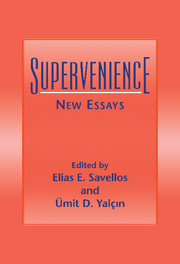Book contents
- Frontmatter
- Contents
- List of Contributors
- Introduction
- Varieties of Supervenience
- Supervenience: Model Theory of Metaphysics?
- “Global” Supervenient Determination: Too Permissive?
- Weak Supervenience Supervenes
- The Tweedledum and Tweedledee of Supervenience
- Reduction in the Mind of God
- Psychophysical Supervenience, Dependency, and Reduction
- Supervenience Redux
- Nonreducible Supervenient Causation
- Physicalism, Supervenience, and Dependence
- An Argument for Strong Supervenience
- Arguments for Supervenience and Physical Realization
- Supervenience and the Essences of Events
- How Does Ontology Supervene on What There Is?
- Supervenience and Intentionality
- Supervenience, Coherence, and Trustworthiness
- Does Truth Supervene on Evidence?
- Index
Supervenience Redux
Published online by Cambridge University Press: 29 March 2010
- Frontmatter
- Contents
- List of Contributors
- Introduction
- Varieties of Supervenience
- Supervenience: Model Theory of Metaphysics?
- “Global” Supervenient Determination: Too Permissive?
- Weak Supervenience Supervenes
- The Tweedledum and Tweedledee of Supervenience
- Reduction in the Mind of God
- Psychophysical Supervenience, Dependency, and Reduction
- Supervenience Redux
- Nonreducible Supervenient Causation
- Physicalism, Supervenience, and Dependence
- An Argument for Strong Supervenience
- Arguments for Supervenience and Physical Realization
- Supervenience and the Essences of Events
- How Does Ontology Supervene on What There Is?
- Supervenience and Intentionality
- Supervenience, Coherence, and Trustworthiness
- Does Truth Supervene on Evidence?
- Index
Summary
In recent years, philosophers bent on defending physicalism have been attracted to the notion that apparently nonphysical features of our world supervene on its physical features. Mental and moral properties, for instance, though not perhaps identifiable with or reducible to physical properties, are thought nevertheless to depend on, and to be determined by, physical properties. More generally, supervenience claims are taken to range over collections or “families” of supervenient properties (A-properties) regarded as depending on distinct families of subvenient B-properties. I shall designate claims of this sort “A/B-supervenience” claims. Sometimes the supervenience relation is distilled into a pair of slogans: “No A-difference without a B-difference”; “Two objects identical with respect to their B-properties must be identical with respect to their A-properties.”
According to Richard Miller, appeals to supervenience on behalf of physicalism are empty; it is “trivially” true that “the nonphysical supervenes on the physical.” Worse,
it is equally true that the physical supervenes on the moral, the mental, and the aesthetic. “No difference without a physical difference” is an excellent slogan. The gist of this paper can also be summarized with slogans. “No difference without a moral difference,” “no difference without a mental difference,” and “no difference without an aesthetic difference,” are as (trivially) true as the physicalist slogan.
(p. 695)Miller advances a pair of interesting and important claims. First, the supervenience of the nonphysical on the physical is “trivial.” Second, the supervenience relation is invariably symmetrical: when As supervene on Bs, the supervenience of Bs on As is “all but guaranteed.”
- Type
- Chapter
- Information
- SupervenienceNew Essays, pp. 158 - 168Publisher: Cambridge University PressPrint publication year: 1995
- 1
- Cited by



